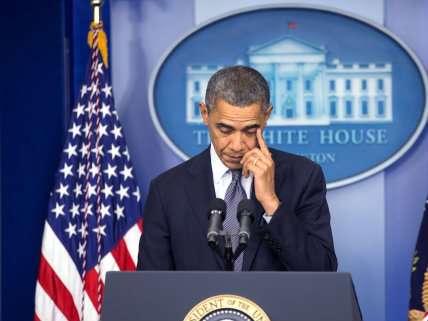3 Takeaways from Today's Big Rulings on Obamacare's Subsidies

The administration's implementation of Obamacare took a potentially fatal blow this morning when a three-judge panel in D.C. Circuit Court ruled that the administration has no legal authority to disburse subsidies through the health law's federally run insurance exchanges. The ruling dealt with technical aspects of legislative language and congressional intent, but the basic issue was incredibly straightforward and easy to understand: The law says that subsidies are limited to exchanges "established by a State" under a particular provision of the law. The court therefore ruled that exchanges established by the federal government did not count as exchanges established by "a State."
Not long after that ruling came out, however, the fourth circuit court released a ruling coming to the opposite conclusion. It declared the overall language of the law, when looked at as a whole, to be ambiguous, and it ultimately sided with the administration, saying that the subsidies are necessary to fulfill the law's policy goals, and are therefore authorized by the law.
The conflict guarantees that the issue will drag on for a while, either to an en banc review by the entire circuit or perhaps to a Supreme Court appeal. Obviously, then, there's still a lot that's up in the air. Yet a few things did become clear today. Here are three big takeaways from today's Obamacare rulings.
1. The plain language of the relevant statute is undeniably clear. The D.C. Circuit essentially concluded that the government could not provide a good enough legal rationale for ignoring the plain meaning of the text. Even the Fourth Circuit, which held that the subsidies are authorized under the law, admitted that the challengers had a point about the particular language governing subsidies: "The plaintiffs' primary rationale for their interpretation is that the language says what it says, and that it clearly mentions state-run Exchanges….If Congress meant to include federally-run Exchanges, it would not have specifically chosen the word 'state' or referenced [the section of the law dealing specifically with state-based exchanges]." The ruling goes on to say that "the court cannot ignore the common-sense appeal of the plaintiffs' argument; a literal reading of the statute undoubtedly accords more closely with their position." This is the declaration of the court that ultimately agreed with the administration. In other words, only through a more expansive, non-literal reading can one side with the administration's approach.
2. The challenge is legitimate. As with the challenge to Obamacare's individual mandate, which ultimately lost at the Supreme Court, the health law's backers and the liberal legal community had long argued that the argument made by the challengers was more or less meritless. The win in the D.C. Circuit makes clear that it is not, and even the Fourth Circuit ruling concedes that it is a tough call, saying that "the applicable statutory language is ambiguous and subject to multiple interpretations" and only coming to its conclusion by "applying deference to the IRS's determination." Basically, the government won not because it was obviously in the right, but because it got the benefit of the doubt.
3. Another court has ruled that the president is breaking the law. The Supreme Court repeatedly ruled against the administration in a variety of cases this year, including the Hobby Lobby decision regarding Obamacare's contraceptive mandate, the administration's interpretation of chemical weapons law, and the president's recess appointment powers. The theme of these cases is clear: that the Obama administration had overstepped the bounds of its authority. The same goes for the D.C. Circuit's ruling in Halbig. One of the messages of the decision is that the Obama administration had no authority to offer subsidies through the federally run exchanges, that the IRS was not within its legal rights to authorize those credits, and that the executive branch has broken the law in making those subsidies available.


Show Comments (31)